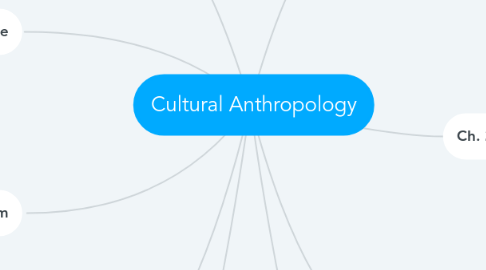Cultural Anthropology
by Adrian Palacios

1. Ch. 5: Human Origins
1.1. Deep Time: A framework for considering the span of human history within the much larger age of the universe and planet Earth.
1.2. Theory of Evolution/Creationism
1.3. "Survival of the Fittest"
1.4. Genetic Drift: Random, unpredictable changes in the gene frequencies in a popl. from one gen to the next...
2. Ch. 4: Language
2.1. Dialect: A non-standard variation of a language.
2.2. Lexicon: All the words for Names, Ideas, and Events that make up a language dictionary.
2.3. Myriad of symbols, sounds and gestures
3. Ch. 7: Ethnicity and Nationalism
3.1. Ethnicity: A sense of historical, cultural and sometimes ancestral connection to a group of people who are imagined to be distinct from those outside the group.
3.2. Nationalism: The desire of an ethnic community to create and/or maintain a nation-state.
3.3. Anti-Colonialism
4. Ch. 11: Class and Inequality
4.1. Class: A system of power based on wealth, income, and status that creates an unequal distribution of a society's resources.
4.2. Ranked Society: A group in which wealth is not stratified but prestige and status are.
4.3. Social Mobility: The movement of one's class position, upward or downward, in stratified societies.
4.4. Wealth
4.5. Bourgeoisie & proletariat
5. Ch. 15: Religion
5.1. Martyr: A person who sacrifices his or her life for the sake of his or her religion.
5.2. Rite of Passage: A category of ritual that enacts a change of status from one life stage to another, either for an individual or for a group.
5.3. Karl Marx
5.4. Communitas
6. Ch. 1: Anthro in a Global Age
6.1. Anthropology: The study of the full scope of human diversity, past and present, and the application of the knowledge to help people of different backgrounds better understand one another.
6.2. Physical Anthropology
6.3. Paleoanthropology
6.4. Primatology
6.5. Archaeology/Pre-/Historic
6.6. Linguistic Anthropology
6.7. Globalization/Migration
7. Ch. 2: Culture
7.1. Culture: A system of knowledge, beliefs, patterns of behavior, artifacts, and institutions that are created, learned, shared and contested by a group of people.
7.2. Norms
7.3. Symbols
7.4. Values
7.5. Stratification
8. Ch. 8: Gender
8.1. Gender: The expectations of thought and behavior that each culture assigns to people of different sexes.
8.2. Sexual Dimorphism: The phenotypic differences between males and females of the same species.
8.3. Masculine/Feminine
8.4. Intersex
9. Ch. 12: The Global Economy
9.1. Economy: A cultural adaptation to the environment that enables a group of humans to use the available land, resources, and labor to satisfy their needs and to thrive.
9.2. Triangle Trade: The extensive exchange of slaves, sugar, cotton, and furs between Europe, and the Americas that transformed political, economic and social life on both sides of the Atlantic.
9.3. Colonialism
9.4. Core Countries


